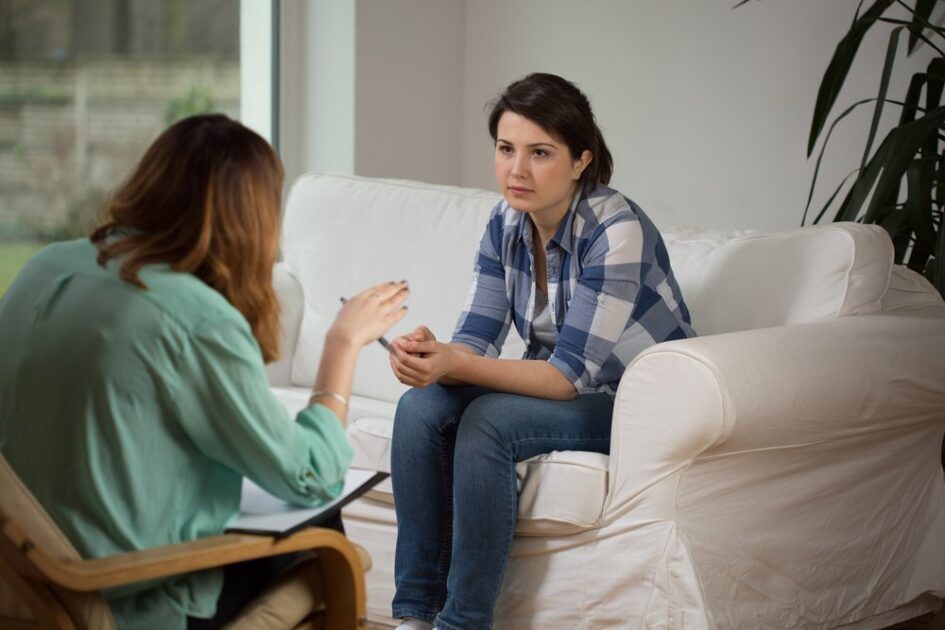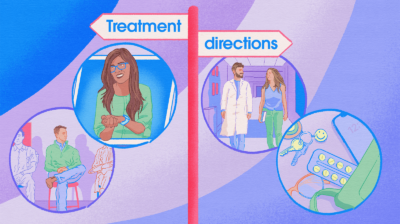Attending Child and Adolescent Mental Health Services (CAMHS)
Learn more about who attends CAMHS, the referral process, and what to expect at your first appointment.

Community Child and Adolescent Mental Health Services (CAMHS) support young people under the age of 18 to recover from mental health challenges negatively impacting their daily lives. Within community CAMHS, teams of mental health professionals provide assessment, diagnosis and treatment of mental health difficulties. These difficulties include moderate to severe anxiety and depression. CAMHS teams are based in day hospitals and community outpatient clinics near to the homes of the young people they support.
Who attends CAMHS?
CAMHS is a specialised mental health service for young people under 18. They were set up to support about 2 per cent of young people experiencing moderate to severe mental health issues. Mental health difficulties are often described as existing on a spectrum from mild to severe. Whether your mental health condition is considered mild, moderate or severe depends on the types of symptoms you’re experiencing. It also depends on how long you’ve had symptoms and how much these symptoms affect your everyday functioning.
Moderate to severe mental health challenges cause substantial emotional distress (e.g., persistent sadness, worry, or difficulties concentrating). This emotional distress can impact a person’s long-term ability to go to school, engage in hobbies, and maintain relationships.
Your GP or another mental health professional might refer you to your local CAMHS for additional support. They may do so if you are experiencing:
- Moderate to severe anxiety
- Moderate to severe depression
- Significant mood swings
- Unusual beliefs, hallucinations or disturbed thoughts indicative of psychosis
- Moderate to severe eating difficulties
- Suicidal thoughts along with a mental health condition
Mental health professionals can also refer you to community CAMHS if they suspect you have moderate to severe attention deficit hyperactivity disorder (ADHD). Although ADHD is a neurodevelopmental condition, not a mental health condition, it still affects how your brain develops and functions. Living with ADHD symptoms without a diagnosis or the right support can lead to increased emotional distress. Research also shows that people with ADHD are more likely to experience mental health challenges.
What is a CAMHS multidisciplinary team?
CAMHS teams provide multidisciplinary support. A multidisciplinary team (MDT) is a group of professionals with different types of training who work together, combining their skills to achieve a common goal. The number and type of professionals in your local MDT can vary depending on where you live. In community CAMHS, MDTs are generally made up of the following types of mental health professionals:
- Doctors, including psychiatrists, junior doctors, and registrars. (A junior doctor is a newly qualified doctor who is in the early stages of their medical career, usually working under supervision in hospitals to gain practical experience. A medical registrar is a doctor who is in advanced training to specialise in a specific area of medicine after completing their basic medical education)
- Psychologists
- Social care workers
- Nurses
- Speech and language therapists
- Social workers
- Occupational therapists
- Administrators
- Team coordinators
- Dieticians
Keep in mind that if you attend CAMHS, you are unlikely to work with all members of the MDT. Instead, you will probably work regularly with specific members who have the specific skills and training relevant to your individual needs.
Who can refer me to CAMHS?
Unlike some mental health services, you cannot refer yourself to CAMHS. To get support from a CAMHS multidisciplinary team (MDT), you’ll need a referral from your GP or one of the following professionals. The professionals listed below do not typically make this decision without speaking to your GP:
- Paediatrician
- Consultant psychiatrist
- Tusla — The Child and Family Agency
- A senior clinician at Jigsaw
- National Educational Psychologist
- HSE Primary Care Psychologist
There are two other ways to access CAMHS (Child and Adolescent Mental Health Services), which are explained below. These include: being referred by an emergency department doctor and transferring from community CAMHS to inpatient CAMHS.
Emergency department to CAMHS
If you’re referred to CAMHS by a doctor in the emergency department, the hospital team will work with your local community CAMHS team. After your referral is accepted, the hospital will make sure CAMHS has all the information they need before you leave the hospital. They will create a plan for you to be seen by your local community CAMHS.
Community CAMHS to inpatient CAMHS
Sometimes, if a young person has very severe mental health needs that can’t be addressed in community CAMHS, they may need to be referred to an inpatient CAMHS facility. In Ireland, there are a few inpatient CAMHS settings that provide specialised mental health treatment for young people whose needs cannot be met in a community setting. Read more about inpatient mental health treatment and your rights.
What happens when you attend CAMHS?
Attending CAMHS can be daunting if you’re unsure of what to expect. Here’s a breakdown of a typical journey through CAMHS to help you understand the steps involved. This journey is based on the HSE CAMHS Operational Guidelines 2019, which outlines the best practices and procedures for CAMHS teams. However, due to staff shortages and other ongoing challenges, your experience with CAMHS may differ from these guidelines.
1. Getting started
A mental health professional, such as your GP, refers you to your local CAMHS team by filling out the relevant referral form.
2. Reviewing your referral
The CAMHS team reviews the referral to see if CAMHS is the right fit for you based on your specific mental health needs. If CAMHS determines they are not the right service, the team writes to your GP explaining why the referral could not be accepted.
3. Your first appointment
If CAMHS is the right service, the CAMHS team writes to your GP explaining whether they have marked your as “emergency”, “urgent” or “routine.” The team schedules a first appointment based on the level of urgency. If no appointment is available, they place you on a waiting list until one becomes available.
The CAMHS team may ask you and/or your guardian to fill out some forms or questionnaires in advance of the first appointment. Doing so helps the team with their decision making.
When the appointment is scheduled, the CAMHS team will carry out an initial assessment to get to know you better and understand your needs. The assessment usually involves two members of the CAMHS team who will talk to you and your parent(s)/ guardian about what has been going on. The assessment may be completed over a couple of sessions.
4. Planning your care
After the assessment, the CAMHS team discusses the best way to support you and assigns a key worker to guide you and your family through the process. The key worker is your and your family’s main point of contact throughout the process. They coordinate the care provided by other members of the MDT. They also make sure that your care team is following the recovery goals you agreed on with them during the initial assessment.
5. Creating your Individual Care Plan
Together with the CAMHS team and your family, you create an Individual Care Plan (ICP) which outlines your goals for treatment and recovery. With the guidance and support of the CAMHS team, you work towards the goals you’ve set in your ICP.
6. Reviewing your progress
The multidisciplinary team conducts regular reviews of the care plan to make sure it is still meeting your needs. If, after a review, you and others find that you’re not yet ready to move forward independently, the CAMHS team will continue to provide support and treatment.
7. Discharge
If, after a review, you and others find that you have met your recovery goals and feel ready to move forward on your own, the CAMHS team will start planning for your discharge.
I’m on CAMHS waiting list and need support now
If your local CAMHS team accepts your referral, they usually send a letter to you and your doctor. This letter outlines whether CAMHS has marked your referral as urgent or routine and estimates the waiting time for the first appointment. Depending on the urgency of your case and the current level of demand in your area, CAMHS may see you within several weeks or may have to wait up to a year or more for your first appointment.
There are ways you can mind your mental health while you’re waiting, such as accessing support from mental health organisations, using evidence-based mental health apps, and practising your own positive coping strategies. Remember to contact your GP if your mood worsens and keep them up-to-date with any changes you notice in your mental health.
Read more about the free and low-cost mental health support services that are available, including:
- Helplines
- Free 24/7 messaging services, like Text About It
- Charities providing education about mental health issues and support groups
Check out our factsheets on how to build new coping skills, how to change unhelpful thought patterns, and how to regulate your emotions.
Why didn’t CAMHS accept my referral?
CAMHS reviews referrals based on several factors. These factors include how your mental health challenges affect your daily life and whether you have a support network. They also consider whether you might benefit more from accessing other treatment options in your community or through primary care, like your GP or a psychologist.
CAMHS has specific criteria for accepting referrals. They are less likely to accept a referral if:
- You are not under 18 years of age
- You are under 18 years old, but your parents have not consented to your GP or another mental health professional making the referral
- Your mental health issues can be successfully managed in primary care. Primary care refers to the initial point of contact between a patient and the healthcare system, and includes community services, like your local GP, public health nurses, psychologists, etc. (Read more about the types of mental health services in Ireland and how they’re structured in our factsheet on how to get mental health treatment in Ireland.)
If CAMHS does not accept your referral, it may be helpful to discuss alternative support options with your GP.
Alternative support if CAMHS does not accept your referral
CAMHS might not accept your referral in some cases, even if you are experiencing significant emotional distress. Below are some situations where CAMHS typically does not provide support, along with alternative services that might help. Keep in mind that many of these services may have long waiting times and people’s experiences of accessing and receiving care through these services can vary greatly.
Developmental conditions
If your emotional distress is related to conditions like dyslexia, autism, or developmental coordination disorder, you may find support through HSE primary care services or Children’s Disability Network Teams (CDNT). A CDNT provides specialised support for children and young people under 18 years who have a disability and complex health needs. A healthcare professional can refer you to a CDNT or your parent can self-refer you to a CDNT using the Children’s Services Referral Form available on the HSE website.
If you have a developmental condition like autism as well as moderate to severe mental health issues, CAMHS can treat your mental health condition while coordinating with other support services or care providers.
Child abuse or neglect
Your difficulties might stem from abuse or neglect at home rather than a mental health condition. If this is the case, Tusla (The Child and Family Agency) or your local Family Resource Centre may provide more appropriate support.
‘Mild’ Mental Health Difficulties
If you are experiencing mild mental health issues, primary care services or other HSE-funded options, like the Jigsaw or digital guided cognitive behavioural therapy (CBT), might be appropriate.
Know that you are equally deserving of care and support, even if professionals refer to your mental health difficulties as “mild.” The mental health system in Ireland uses the categories like mild, moderate, and severe to determine which healthcare services are most suitable for a person. However, ‘mild’ mental health issues can be distressing and impact your life and functioning. Having ‘mild’ mental health difficulties doesn’t mean you deserve less help. It can simply suggest that the type of support CAMHS provides may not be the best fit for your needs.
Read more about the free and low-cost mental health support services that are available, including:
- Helplines
- Free 24/7 messaging services
- Charities providing education about mental health issues and support groups
Learning Difficulties
For challenges related to learning at school rather than mental health issues, an educational psychological assessment from the National Educational Psychology Services (NEPS) might be helpful. If you and your family want to apply for NEPS services, contact the school principal of your school. They may be able to provide more information on how to get a free assessment.
Intellectual Disabilities
You may have a moderate to severe intellectual disability alongside a moderate to severe mental health condition. If so, you may receive more appropriate support from CAMHS Mental Health Intellectual Disability (MHID) teams. If no MHID team is available in your area, the Children’s Disability Network Teams in HSE Disability Services may offer support. To access a MHID, you will need a referral from your doctor.
However, if you have a mild intellectual disability with a moderate to severe mental health condition, CAMHS might still be able to provide support.
What to expect from CAMHS initial assessment
At your first appointment, you’ll meet with one or more members of the CAMHS team to make sure that CAMHS is the right service for you and that you and your family are comfortable with the process. This initial assessment will cover several areas, including:
- Your personal details, like age, gender identity, and address
- Your thoughts and feelings about your current situation
- Your history of family and close relationships
- Your education and school experience
- Your physical health and lifestyle
- An assessment of any potential risks to yourself or others, such as suicidal thoughts, history of aggression, or self-neglect
- Your strengths and protective factors, like a good support network or other things that help protect your mental health during difficult times
Your Individual Care Plan (ICP)
The initial assessment may take place over a few sessions. During this assessment, a member of the team may ask to meet with you and your parent/ guardian separately and then speak with you together. After the assessment, your care team will assign you a key worker. Your key worker will be your main point of contact and will coordinate all the care provided by the CAMHS team. The key worker will also be responsible for ensuring that members of the team are following your Individual Care Plan (ICP). Your ICP outlines your recovery goals, along with any care or treatment agreed upon to support your mental health. The CAMHS multidisciplinary team should conduct a review of how you’re progressing with your care plan and recovery at a minimum of every six months. Your key worker is responsible for ensuring that this review takes place.
You can take an active part in developing your ICP with your care team. Both you and a trusted family member should sign off on it before the CAHMS team puts it into action. Your ICP should contain the following information:
- A clinical formulation or diagnosis, if relevant (A clinical formulation is a detailed explanation of how factors in your life contribute to your mental health challenges, helping to guide your treatment)
- Your recovery goals
- A list of other agencies or care providers involved in your support
- A risk and safety plan
- A discharge and transition plan, which might include a provisional discharge date that professionals can adjust as your needs evolve
Moving from CAMHS to AMHS
If you are still attending CAMHS at age 17, your CAMHS team should start preparing you for the move to Adult Mental Health Services (AMHS) at least six months before your 18th birthday. This applies if you and your CAMHS team feel that you will need ongoing mental health support. This preparation may include:
- Adding a transition plan to your Individual Care Plan (ICP) if needed
- Assessing your future care needs for a smooth transition, whether or not a transition plan is in place
- Transferring key information from CAMHS to AMHS. This usually includes a detailed referral letter or copy of your ICP, a risk assessment, and records of any medication. It can also cover physical health needs and treatments provided by the CAMHS team
Because AMHS operates differently from CAMHS, this transitional period is crucial for you and your family to adjust to changes. This is especially important during a critical time in your life when you may be facing other major challenges. These might include sitting state exams or applying to university courses. Your consultant psychiatrist and key worker are responsible for ensuring a smooth handover of information from CAMHS to AMHS. CAMHS may transfer some young people, who may not need the support of AMHS, to the care of their GP at this stage.






